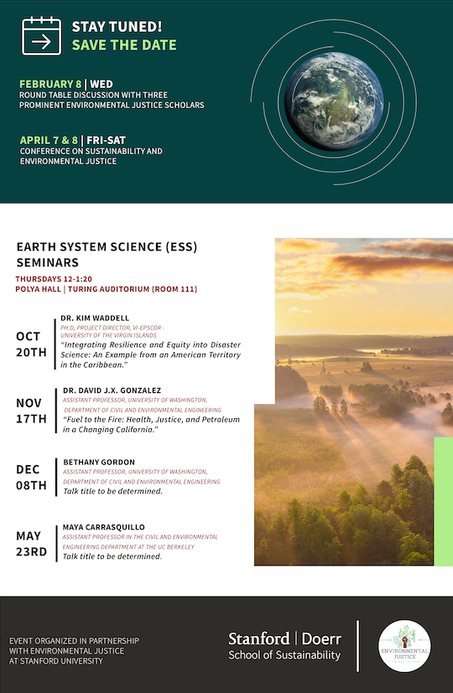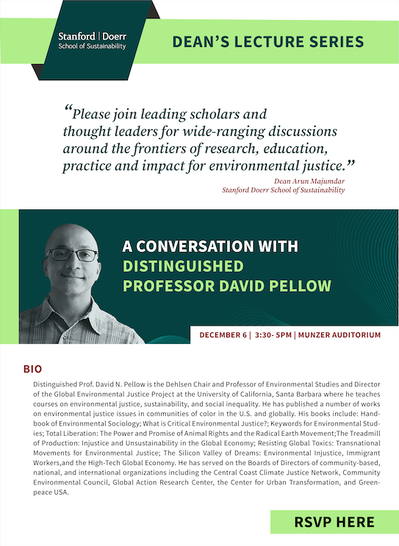Doerr School of Sustainability Dean’s Lecture Series featuring EJ Scholarship
|
In Autumn 2022, the new Stanford Doerr School of Sustainability announced a Dean’s Lecture Series, launching with a focus on Scholarship in Environmental Justice. The goal of this lecture series is to bring together scholars and thought leaders for discussions around the frontiers of research, education, practice, and impact related to areas of sustainability. Events were organized in partnership with the Environmental Justice Working Group at Stanford University. List of events!
|
|
Featured Event:
A Conversation with Distinguished Professor David Pellow In partnership with the EJ Working Group, the Lecture Series launched with a conversation on environmental justice with Prof. David Pellow on December 6th, 2022 (recording of the event here). Please click here for an article about the event. Dr. Pellow is the Dehlsen and Department Chair of Environmental Studies and Director of the Global Environmental Justice Project at the University of California, Santa Barbara where he teaches courses on environmental and social justice, race/class/gender and environmental conflict, human-animal conflicts, sustainability, and social change movements that confront our socio-environmental crises and social inequality. He has volunteered for and served on the Boards of Directors of several community-based, national, and international organizations that are dedicated to improving the living and working environments for people of color, immigrants, indigenous peoples, and working class communities, including the Global Action Research Center, the Center for Urban Transformation, the Santa Clara Center for Occupational Safety and Health, Global Response, Greenpeace USA, and International Rivers. |
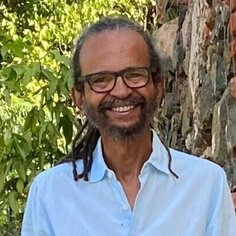
Integrating Resilience and Equity into Disaster Science: An Example from an American Territory in the Caribbean
ESS Seminar Series: Dr. Kim Waddell
Oct 20, 2022 12-1pm
The Territory of the United States Virgin Islands (USVI), the Commonwealth of Puerto Rico, and many other small island states in the Northeastern Caribbean were devastated by two Category 5 Hurricanes in September of 2017. As part of the response and recovery process, the U.S. Federal Emergency Management Agency (FEMA) requested an expansive update of the Territory’s Hazard Mitigation Plan (HMP)- a plan that, in this update, would integrate elements of resilience, equity, and climate change impacts into the planning effort.
These elements have not been identified or integrated into previous HMPs in the Territory or in the vast majority of HMPs for other states and jurisdictions. The 3-year planning effort has led to insights about island governance, human capacity, colonial legacies, and socio-economic inequities that can be exacerbated by federal policy and practices following disasters. These inequities, persistent during the best of times, become severe when human and financial resources are stretched thin, as basic services and societal functions struggle to resume. The damages from the 2017 hurricanes were estimated at $8B for a territory of 100,000 people and a GDP of $4B. This level of devastation was followed by a slow response & recovery, and then the pandemic. All these disruptions coincide with a loss of 18 percent of the population according to the 2020 US Census – based on a social vulnerability analysis we conducted; the population losses were most pronounced in our most vulnerable (low income) communities--reminiscent of the demographic shifts observed in New Orleans post-Katrina.
Our research team has developed recommendations to address many of these inequities but have recognized the difficulties of promoting resilience thinking and strategies. Many of these approaches require systems thinking, strong operational governance, and good data management to rigorously inform risk mitigation. Such practices are difficult to understand, implement and sustain in rural and remote communities, but especially in small island tourism-based economies. The team’s findings have implications for how we think about applying Disaster Science principles and practices, and especially identifying what is needed to implement resilience and equity into projects developed to mitigate hazards for the natural, built, and human environments.
Click here for event webpage and speaker bio.
ESS Seminar Series: Dr. Kim Waddell
Oct 20, 2022 12-1pm
The Territory of the United States Virgin Islands (USVI), the Commonwealth of Puerto Rico, and many other small island states in the Northeastern Caribbean were devastated by two Category 5 Hurricanes in September of 2017. As part of the response and recovery process, the U.S. Federal Emergency Management Agency (FEMA) requested an expansive update of the Territory’s Hazard Mitigation Plan (HMP)- a plan that, in this update, would integrate elements of resilience, equity, and climate change impacts into the planning effort.
These elements have not been identified or integrated into previous HMPs in the Territory or in the vast majority of HMPs for other states and jurisdictions. The 3-year planning effort has led to insights about island governance, human capacity, colonial legacies, and socio-economic inequities that can be exacerbated by federal policy and practices following disasters. These inequities, persistent during the best of times, become severe when human and financial resources are stretched thin, as basic services and societal functions struggle to resume. The damages from the 2017 hurricanes were estimated at $8B for a territory of 100,000 people and a GDP of $4B. This level of devastation was followed by a slow response & recovery, and then the pandemic. All these disruptions coincide with a loss of 18 percent of the population according to the 2020 US Census – based on a social vulnerability analysis we conducted; the population losses were most pronounced in our most vulnerable (low income) communities--reminiscent of the demographic shifts observed in New Orleans post-Katrina.
Our research team has developed recommendations to address many of these inequities but have recognized the difficulties of promoting resilience thinking and strategies. Many of these approaches require systems thinking, strong operational governance, and good data management to rigorously inform risk mitigation. Such practices are difficult to understand, implement and sustain in rural and remote communities, but especially in small island tourism-based economies. The team’s findings have implications for how we think about applying Disaster Science principles and practices, and especially identifying what is needed to implement resilience and equity into projects developed to mitigate hazards for the natural, built, and human environments.
Click here for event webpage and speaker bio.
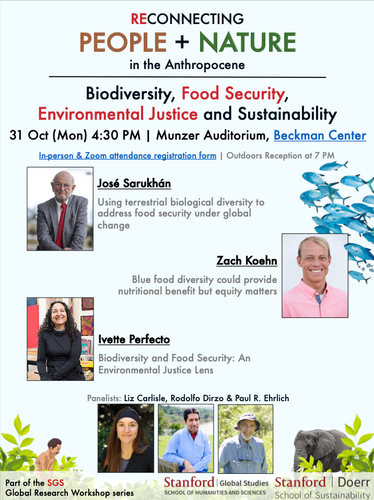
Reconnecting PEOPLE + NATURE in the Anthropocene
Biodiversity, Food Security, Environmental Justice and Sustainability
Oct 31, 2022 4:30-7pm (seminar + reception)
Seminar series highlighting the contributions of biodiversity to global food security, featuring José Sarukhán (UNAM), Zach Koehn (Stanford), Ivette Perfecto (UMich), Liz Carlisle (UCSB), Rodolfo Dirzo (Stanford) and Paul R. Ehrlich (Stanford).
This event is part of the Reconnecting People + Nature in the Anthropocene seminar series, sponsored by the Global Studies Division (Global Research Workshops) and the Doerr School of Sustainability.
Click here for event webpage and event flyer.
A recording of the event is available here.
Biodiversity, Food Security, Environmental Justice and Sustainability
Oct 31, 2022 4:30-7pm (seminar + reception)
Seminar series highlighting the contributions of biodiversity to global food security, featuring José Sarukhán (UNAM), Zach Koehn (Stanford), Ivette Perfecto (UMich), Liz Carlisle (UCSB), Rodolfo Dirzo (Stanford) and Paul R. Ehrlich (Stanford).
This event is part of the Reconnecting People + Nature in the Anthropocene seminar series, sponsored by the Global Studies Division (Global Research Workshops) and the Doerr School of Sustainability.
Click here for event webpage and event flyer.
A recording of the event is available here.
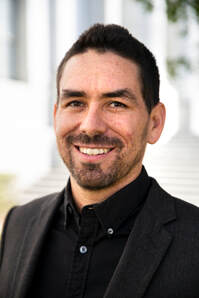
Fuel to the Fire: Health, Justice, and Petroleum in a Changing California
ESS Seminar Series: Dr. David J. X. Gonzalez
Nov 17, 2022 12-1:20pm
Millions of people across the U.S. live in neighborhoods with oil and gas development. In this talk, Dr. Gonzalez will share recent findings on racial and socioeconomic disparities in the siting of oil and gas wells and how historical racist federal policies have contributed to environmental health inequities. As California lawmakers adopt new evidence-based policies to protect communities from hazards associated with oil and gas development, we'll also discuss how a changing climate may lead to further hazards from legacy abandoned oil and gas infrastructure.
Click here for event webpage and speaker bio.
ESS Seminar Series: Dr. David J. X. Gonzalez
Nov 17, 2022 12-1:20pm
Millions of people across the U.S. live in neighborhoods with oil and gas development. In this talk, Dr. Gonzalez will share recent findings on racial and socioeconomic disparities in the siting of oil and gas wells and how historical racist federal policies have contributed to environmental health inequities. As California lawmakers adopt new evidence-based policies to protect communities from hazards associated with oil and gas development, we'll also discuss how a changing climate may lead to further hazards from legacy abandoned oil and gas infrastructure.
Click here for event webpage and speaker bio.
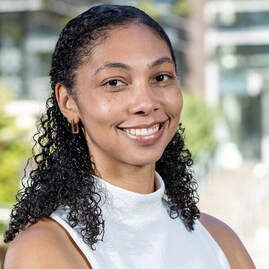
Cultivating a practice of inclusive collaboration through reflexivity in STEM: Lessons from integrating justice and engineering
ESS Seminar Series: Dr. Bethany Gordon
Dec 8, 2022 12-1:20pm
Decision-making for the built environment can perpetuate harm and enhance systemic oppression and inequality in society. Therefore, it is imperative that these challenges be addressed in education. This seminar will discuss an approach to inclusive collaboration developed by a team of graduate students seeking to integrate justice topics into an engineering curriculum. Synthesized through a process of collaborative autoethnography, the analysis revealed three key themes: 1) fostering a reflexive practice through values and positionality, 2) engineering space for inclusive collaboration, and 3) seeing justice as a necessary lens for engineering education.
Click here for event webpage and speaker bio.
ESS Seminar Series: Dr. Bethany Gordon
Dec 8, 2022 12-1:20pm
Decision-making for the built environment can perpetuate harm and enhance systemic oppression and inequality in society. Therefore, it is imperative that these challenges be addressed in education. This seminar will discuss an approach to inclusive collaboration developed by a team of graduate students seeking to integrate justice topics into an engineering curriculum. Synthesized through a process of collaborative autoethnography, the analysis revealed three key themes: 1) fostering a reflexive practice through values and positionality, 2) engineering space for inclusive collaboration, and 3) seeing justice as a necessary lens for engineering education.
Click here for event webpage and speaker bio.
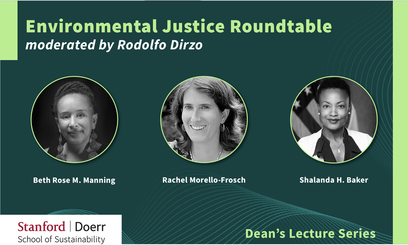
Environmental Justice Roundtable
with Professor Beth Rose M. Manning, Professor Rachel Morello-Frosch, and Honorable Shalanda H. Baker
Moderated by Rodolfo Dirzo
Feb 8, 4:30-6pm
This upcoming Environmental Justice Roundtable with Honorable Shalanda H. Baker, Professor Rachel Morello-Frosch, Professor Beth Rose Middleton Manning, and Professor Rodolfo Dirzo as moderator will showcase the scholarship of Environmental Justice (EJ) and discuss the interaction of EJ and public policy.
Together, these speakers will bring a unique and comprehensive perspective to the conversation by exploring their respective fields of expertise which will help build a better understanding of environmental justice and how to move forward with policy change.
Click here for event webpage and news article. A recording of the event can be found here
with Professor Beth Rose M. Manning, Professor Rachel Morello-Frosch, and Honorable Shalanda H. Baker
Moderated by Rodolfo Dirzo
Feb 8, 4:30-6pm
This upcoming Environmental Justice Roundtable with Honorable Shalanda H. Baker, Professor Rachel Morello-Frosch, Professor Beth Rose Middleton Manning, and Professor Rodolfo Dirzo as moderator will showcase the scholarship of Environmental Justice (EJ) and discuss the interaction of EJ and public policy.
Together, these speakers will bring a unique and comprehensive perspective to the conversation by exploring their respective fields of expertise which will help build a better understanding of environmental justice and how to move forward with policy change.
Click here for event webpage and news article. A recording of the event can be found here

Please also join us in sharing a hearty student-centered breakfast and discussion with the Honorable Shalanda Baker, Professor Rachel Morello-Frosch, and Professor Beth Rose Middleton Manning on the Mitchell Patio!
Our esteemed guests will be on campus on Wednesday, February 8th to participate in a roundtable discussion as part of the Dean's Lecture Series on Environmental Justice Scholarship, and they will generously be sharing a morning meal with students from 9-10:30am earlier that day.
Breakfast will begin at 9am, with discussions to begin at 9:30am. Please RSVP here by February 1st.
What: Breakfast and conversation with Shalanda Baker, Rachel Morello-Frosch, and Beth Rose Middleton Manning
When: Wednesday February 8th, 9-10:30am
Where: Mitchell Patio, 397 Panama Mall, Stanford CA 94305
Our esteemed guests will be on campus on Wednesday, February 8th to participate in a roundtable discussion as part of the Dean's Lecture Series on Environmental Justice Scholarship, and they will generously be sharing a morning meal with students from 9-10:30am earlier that day.
Breakfast will begin at 9am, with discussions to begin at 9:30am. Please RSVP here by February 1st.
What: Breakfast and conversation with Shalanda Baker, Rachel Morello-Frosch, and Beth Rose Middleton Manning
When: Wednesday February 8th, 9-10:30am
Where: Mitchell Patio, 397 Panama Mall, Stanford CA 94305
Beth Rose Middleton Manning is a Professor of Native American Studies at UC Davis whose research focuses on Native environmental policy, Native activism for site protection, intergenerational trauma and healing, Native land stewardship, rural environmental justice, Indigenous analysis of climate change, Afro-indigeneity, qualitative GIS, and Federal Indian law as environmental policy. She has published numerous works and has received her BA in Nature and Culture from UC Davis, and her Ph.D. in Environmental Science, Policy, and Management from UC Berkely. She also serves on two non-profit hoards. the Sierra Institute tor Community and Environment and the Sogorea Te Land Trust and is passionate about working with plants caring for places in community, identifying and addressing embedded colonialism and institutional racism, and centering Indigenous/ Native American, African American, and other diverse perspectives in environmental policy and planning.
Rachel Morello-Frosch is a Professor in the Department of Environmental Science, Policy, and Management and the School of Public Health at UC Berkeley. For over 20 years, her research has examined social determinants of environmental health among diverse communities with a focus on inequality, psychological stress and how these factors interact with environmental chemical exposures to produce health inequalities. Much of her work has examined this environmental justice question in the context of climate chance ambient air pollution, exposures to environmental chemicals and effects on fetal growth and developmental outcomes, often using community-based participatory research methods for data collection. In collaboration with communities and scientists, Dr. Morello-Frosch has also developed science-policy tools for assessing the cumulative impacts of chemical and non-chemical stressors to improve regulatory decision-making and advance environmental justice. In addition to her scientific articles, Rachel is a co-author of Contested Illness: Citizens, Science and Health Social Movements. Her research is supported by NIH, NSF, Cal-EPA, the California Breast Cancer Research Program and private foundations.
Honorable Shalanda H Baker is the Director of the Office of Economic Impact and Diversity at the U.S. Department of Energy Policy. Prior to her appointment, she was a Professor of Law, Public Policy and Urban Affairs at Northeastern University. She was the co-founder and co-director of the Initiative for Energy Justice, which provides technical law and policy support to communities on the front lines of climate change. Baker served as an Air Force officer prior to her honorable discharge pursuant to the then existing “Don't Ask, Don't Tell” policy, and became a vocal advocate for repeal of the policy. She earned a B S. in Political Science from the U S. Air Force Academy, a JD from Northeastern University, and L.L.M. from the University of Wisconsin.
Rachel Morello-Frosch is a Professor in the Department of Environmental Science, Policy, and Management and the School of Public Health at UC Berkeley. For over 20 years, her research has examined social determinants of environmental health among diverse communities with a focus on inequality, psychological stress and how these factors interact with environmental chemical exposures to produce health inequalities. Much of her work has examined this environmental justice question in the context of climate chance ambient air pollution, exposures to environmental chemicals and effects on fetal growth and developmental outcomes, often using community-based participatory research methods for data collection. In collaboration with communities and scientists, Dr. Morello-Frosch has also developed science-policy tools for assessing the cumulative impacts of chemical and non-chemical stressors to improve regulatory decision-making and advance environmental justice. In addition to her scientific articles, Rachel is a co-author of Contested Illness: Citizens, Science and Health Social Movements. Her research is supported by NIH, NSF, Cal-EPA, the California Breast Cancer Research Program and private foundations.
Honorable Shalanda H Baker is the Director of the Office of Economic Impact and Diversity at the U.S. Department of Energy Policy. Prior to her appointment, she was a Professor of Law, Public Policy and Urban Affairs at Northeastern University. She was the co-founder and co-director of the Initiative for Energy Justice, which provides technical law and policy support to communities on the front lines of climate change. Baker served as an Air Force officer prior to her honorable discharge pursuant to the then existing “Don't Ask, Don't Tell” policy, and became a vocal advocate for repeal of the policy. She earned a B S. in Political Science from the U S. Air Force Academy, a JD from Northeastern University, and L.L.M. from the University of Wisconsin.
Environmental Justice and Sustainability Conference
April 7-8, 2023, Stanford University
April 7-8, 2023, Stanford University
Global environmental change — the combined effects of land use change, over-exploitation, biotic and abiotic pollution, and climate change — is having a disproportionately stronger impact on the sectors of society that present the least threat to life-supporting systems.
This situation is likely to continue unless society at large attends to ongoing challenges of environmental injustice (EJ). As a response to social inequality, EJ raises fundamental questions about how we can achieve local and global sustainability goals by addressing the three “Cs” of the Anthropocene: Combating and Changing the Current conditions of global change, social inequity, and colonial legacies of dispossession. Further, how can we aspire to intergenerational well-being and a thriving biosphere, given the complexities of inequitable distribution of environmental harms and benefits in coupled human-natural systems? And how we can we center frontline communities in defining and solving environmental problems in ways that respond to community experiences of racial oppression, and other forms of marginalization?
Environmental justice scholarship is imperative to develop the knowledge needed to create just, ethical, and resilient solutions for sustainability for the world’s most challenging social-environmental problems.
In this conference, we will examine how EJ scholarship contributes to a positive vision for policies and actions that ensure equitable access to environmental benefits and prevent or mitigate the disproportionate impacts of environmental harms for all communities, especially Black, Indigenous, and People of Color communities and economically disadvantaged groups that have been historically marginalized. The conference will invite a discussion of core EJ principles, research methodologies that center frontline community leadership, and research strategies for advancing just transitions, among other EJ Initiative.
Click here for event webpage.
This situation is likely to continue unless society at large attends to ongoing challenges of environmental injustice (EJ). As a response to social inequality, EJ raises fundamental questions about how we can achieve local and global sustainability goals by addressing the three “Cs” of the Anthropocene: Combating and Changing the Current conditions of global change, social inequity, and colonial legacies of dispossession. Further, how can we aspire to intergenerational well-being and a thriving biosphere, given the complexities of inequitable distribution of environmental harms and benefits in coupled human-natural systems? And how we can we center frontline communities in defining and solving environmental problems in ways that respond to community experiences of racial oppression, and other forms of marginalization?
Environmental justice scholarship is imperative to develop the knowledge needed to create just, ethical, and resilient solutions for sustainability for the world’s most challenging social-environmental problems.
In this conference, we will examine how EJ scholarship contributes to a positive vision for policies and actions that ensure equitable access to environmental benefits and prevent or mitigate the disproportionate impacts of environmental harms for all communities, especially Black, Indigenous, and People of Color communities and economically disadvantaged groups that have been historically marginalized. The conference will invite a discussion of core EJ principles, research methodologies that center frontline community leadership, and research strategies for advancing just transitions, among other EJ Initiative.
Click here for event webpage.
